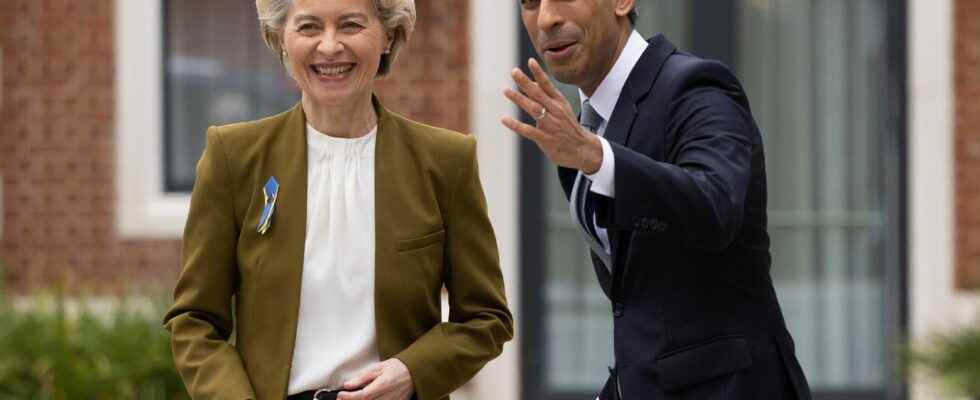It has been a long time since a British Prime Minister and a representative of the European Union – in this case the President of the Commission – had exchanged an accomplice handshake, synonymous with good understanding, or at least cordiality. On Monday February 27, Rishi Sunak and Ursula von der Leyen broke with recurring tensions since 2020. Side by side during a press conference from Windsor Town Hall, west London, they announced everything smile the “Windsor framework”: a substantial revision of the Brexit provisions in Northern Ireland.
After months of tumultuous relations and political deadlock in the British province, the two officials expressed their hope of opening “a new chapter”. It is a “historic” agreement, said the European leader, which “protects the hard-won peace thanks to the Good Friday agreement” of 1998, which ended the conflict between Unionists (mainly Protestants) and Republicans (in majority Catholic) and whose 25th anniversary will be celebrated in April. The compromise was also applauded by French President Emmanuel Macron. “I welcome this important decision which will preserve the Good Friday Agreement and protect our European internal market”, he reacted on his Twitter account.
Easing of customs controls
Signed in 2020, the Northern Irish protocol, negotiated by former Prime Minister Boris Johnson, regulated the movement of goods between the rest of the United Kingdom and Northern Ireland through binding customs declarations. Because after Brexit, Northern Ireland (not in favor of breaking with the 27) remained in the European internal market for goods. The stated objective was to avoid the appearance of a border with the Republic of Ireland, which would have threatened the fragile balance of the Good Friday agreement.
The “Windsor framework” thus drastically lightens the customs controls imposed so far. This compromise must allow “fluid trade within the United Kingdom”, indicated Rishi Sunak. “Cumbersome customs bureaucracy will be eliminated,” he insisted. In concrete terms, products arriving from Great Britain to Northern Ireland to stay there will no longer be subject to the same controls as those destined to be subsequently exported to the Republic of Ireland, that is to say to the European Union. European. This will apply to commercial exchanges as well as to the sending of parcels by individuals.
In addition, certain changes in the rate of VAT or other duties decided by London for the United Kingdom, for example on alcohol, will apply to Northern Ireland, while the constraints on sending and selling in the province of animals or certain plants will be removed. Also, the British authorities, and no longer the European Medicines Agency, will issue marketing authorizations for medicines.
Opposition to the transcription of new European laws
The maintenance of certain European laws and the jurisdiction of the European Court of Justice in Northern Ireland was one of the main sticking points of the protocol for the Unionists. The “Windsor Framework” provides for the creation of a “brake” available to the Northern Irish Parliament. If 30 MPs from several parties oppose the application in the province of a new European law on goods and goods, they will be able to call a vote to block it, on the model of a provision already existing in the agreement peace of 1998.
This “emergency mechanism”, however, will not take away from the European Court of Justice “the last word” with regard to the rules governing the single market, still in force in the province, insisted the President of the European Commission Ursula von der Leyen. Finally, “less than 3%” of European laws will continue to apply in Northern Ireland, argues London.
Speaking on the BBC this Tuesday, February 28, Rishi Sunak said he believed “hand on heart” that “this deal is going to make a huge difference” for businesses and people in Northern Ireland. “That’s what I’m going to talk to people about today, listening to them and explaining how this agreement is going to be positive,” he said during his visit to Northern Ireland to convince, precisely, of the benefits of this “historic” agreement.
